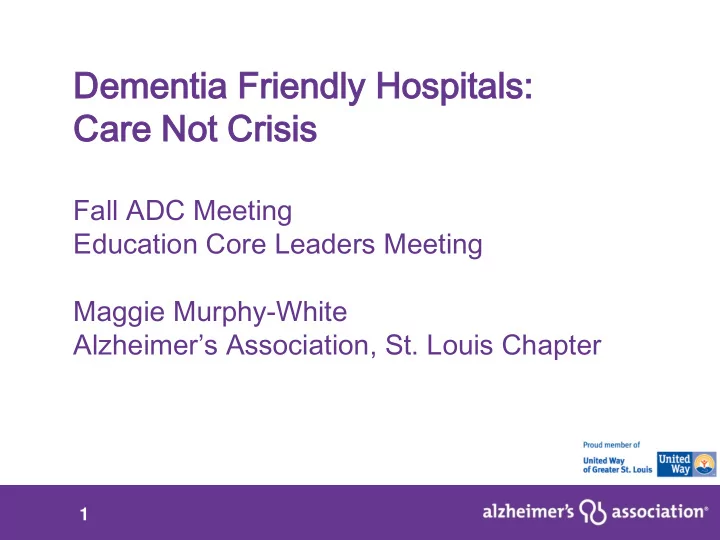

Dement entia ia F Friendl iendly H Hospi pitals als: Care No Ca Not Cr Cris isis Fall ADC Meeting Education Core Leaders Meeting Maggie Murphy-White Alzheimer’s Association, St. Louis Chapter 1
Presentation Goals •Describe the development and history of project •Share Successes and Challenges •Receive feedback for project next steps
Funding • In-Kind Support from ADRC - 2006 – Focus Groups – Video Interviews – 2 Initial Pilots • Retirement Research Foundation – 2007 – National Advisory Panel – Curriculum Revision – 4 hospitals • Practice Change Fellowship – 2009 – University Hospital - ↑ research interest – 6 additional hospitals Both grants were an informal collaboration between Knight ADRC and Alzheimer’s Association, St. Louis Chapter. 3
ADRC Acknowledgements • Tom Meuser, PhD, Director of Education and Rural Outreach (now the Director of Gerontology at the University of Missouri, Saint Louis) • Jessica Lester-Germino, Education Project Coordinator • Ronald Hawley, Video Coordinator and Editor • Janice Palmer, RN, MS, Administrative Director of Washington University Center on Aging • Stacy Jackson, APRN, BC, Nurse Clinician, Dept. of Neurology & Memory and Aging Project • Barbie Kuntemeier, MA, ADRC Education Core Coordinator • James E. Galvin, MD, MPH, Education Core Leader (now at NYU - Director of the Pearl Barlow Center for Memory Evaluation and Treatment, and Associate Director of the Alzheimer Disease Center) • Mary Coats, BS, MS, RN, CS, GCNS, Research Assistant Professor in the Department of Neurology • Joy Snider, MD, PhD, Assistant Professor in the Department of Neurology • Maria Carroll, RN, MSN, CNS - study coordinator And many, many more!! 4
Other Contributors • AA Leadership – Joan D’Ambrose • CNO St. Luke’s • Katie Maslow – Institute of Medicine • Advisory Committee – handout 5
The Issue • Tsunami of elders – 2012 - 5.2 million with Alzheimer’s (over age 65) – 2025 – 6.7 million (30% increase) • Acute care settings are ill equipped to handle the needs of people with dementia • Those 65 & older have an average hospital stay of 5.8 days, which is longer than all other age groups. 6
Older Adults with Dementia Increased Adverse Health Events – Prolonged stays – Medical complications – Adverse medication effects – Negative patient behaviors – Re-admission – Delayed rehabilitation – Increased mortality rates NI NICHE CHE, Try This is Serie ies – see handou ee handout 7
Validation for Education • Hospital Issues Liability / Reimbursement / Quality of Care Physician satisfaction / Customer satisfaction • Staff Issues – Not trained to recognize dementia – Need skills to: advocate/communicate / assess and address needs • Patient Family Issues – Poor Care – Fear / Overwhelmed / Uneducated – 93% do not know AA exists 8
DFHI Goals • Phase 1 – Positive change in participants’ confidence & knowledge – Positive participant opinion/satisfaction with training – Replicable training implemented • Phase 2 – Improved research protocol • Phase 3 – Develop strong partnerships with the hospital – Support hospitals in reducing readmissions 9
Hypothesis Changed Ongoing behaviors/ education improved patient care Improved patient outcomes 10
Working with the Hospital • Keep as simple as possible for the hospital • Develop a team to act as champions – Invite all departments • Work with current initiatives – Falls – Readmission • Grand Rounds • Family Education 11
Curriculum • Module 1: Hospitals & Dementia Care DEMENTIA-FRIENDLY HOSPITALS: • Module 2: Medical Overview Care Not Crisis In partnersh ship w with: • Module 3: Communication & P50-AG005681 This program made possible through funding from the Retirement Research Foundation. Behavior • Module 4: Dementia-Friendly Care • Module 5: Making Connections • Module 6: Case Studies 12
Data • Over 1000 staff educated • 7 hospitals / Chapter Office (9) • Pre / Post / 90 day Delayed Post’ • Initial Data 2007 - 2009 – 690 participants – Dr. Jim Galvin Publication • Current Data 2010 – 2011 – 364 participants – Jan Palmer, SLU – submitted for publication 13
Participant Demographics • Mean age 45 • Years in this profession 16 • Report that 29% of their patients have dementia • 86% of participants have less than 3 hours of dementia education – 48% of all participants have had no dementia training. 14
Training by Profession 15
Confidence Scores 16
Knowledge 17
Conclusion • Class is successful in providing education and increasing participants knowledge and confidence related to caring for people with dementia. Keep chuggin’ along! 18
Growth Opportunities • Deepen relationships with hospitals – Showcase the support that Alzheimer’s Association can provide patients / families and staff. – Offer family education through hospitals for increased marketing and community accessibility. • EMR inclusion 19
Goal: Enhance care for persons with dementia through on-going advanced training. Dementia Friendly Hospital Initiative Goal: Partner with XYZ to provide consumer education Transitional for better patient Care outcomes. Family Program Education (re-admission reduction) Goal: Implement a transitional care model through on-going partnership. 20
Challenges • “Many urgent voices in the market” – Funding – Education – Hospital Priorities – The Big 3 • Heart failure • Pneumonia • Acute MI • Staff Turnover / Champions • Hospital Funding for Non Productive Hours • Un-recognized dementia 21
Successes • Over 1000 hospital employees educated • Educated staff in 15 hospitals • Trained 6 other chapters • Many champions and national partners • St. Louis AA & ADRC Partnership – Best Practice Model 22
Moving Forward • On-line Version • SSM partnership blooms – New Model • Transitional Care Opportunities – Community Partnerships – Funding Opportunities • Family Education Component 23
24
Recommend
More recommend